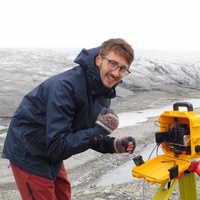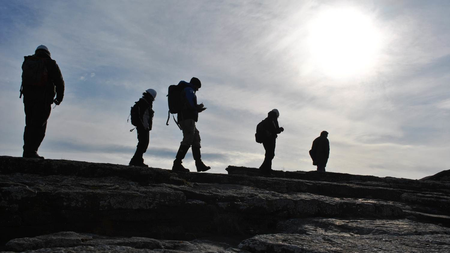
Interdisciplinary Fellow
- About
-
- Email Address
- william.harcourt@abdn.ac.uk
- Office Address
- School/Department
- School of Geosciences
Biography
Will Harcourt is an Interdisciplinary Fellow at the University of Aberdeen leading the development of digital twin technology applied to the Arctic cryosphere. He graduated from the University of Exeter with a 1st Class Honours degree in Geography before moving to the University of Edinburgh to study for a MSc in Geographical Information Science (GIS). Between 2017 and 2018, he was a Research Assistant at Edinburgh Napier University, leading the first ever national scale analysis of seagrass change in the world. In 2022, he completed a PhD at the University of St Andrews where he developed millimetre-wave radar as a tool for mapping and monitoring glaciers. He then joined the University of Aberdeen in 2022 as a Lecturer before starting the interdisciplinary research fellowship in 2023.
Will's research interests span across multiple disciplines, including glaciology, remote sensing & Earth Observation, data science, artificial intelligence, Arctic science and many more. He works across several international organisations such as the Svalbard Integrated Arctic Earth Observing System (SIOS) and the Scottish Alliance for Geoscience, Environment and Society (SAGES), amongst others before. Through these roles, he builds new community tools, organises webinars & workshops and develops future science strategies/priorities. Will also leaves the office to work in the field and has led and participated in several expeditions to locations such as Svalbard, Iceland, the European Alps, the Scottish Highlands and locally within the UK.
Qualifications
- BSc Geography2016 - University of Exeter
- MSc Geographical Information Science (GIS)2017 - University of Edinburgh
- PhD Physics2022 - University of St Andrews
External Memberships
- International Glaciological Society (IGS)
- European Geosciences Union (EGU)
- Royal Geographical Society (RGS)
- Scottish Alliance for Geoscience, Society and Society (SAGES)
- Association of Polar Early Career Scientists (APECS)
- Research
-
Research Overview
My research is highly interdisciplinary and covers subject areas in geographical sciences, computer sciences, physics and more! My research can be grouped into three main area:
Glacier Surges
- Surges are quasi-periodical cycles of fast and slow. Such glaciers are clustered in geographical locations, suggesting their is a shared driver.
- I have a strong interest in understanding Arctic surge-type glaciers, particularly in Svalbard where surge-type glaciers are particularly well studied.
- Quantifying glacier surge behaviour and their driving processes (e.g. basal sliding, energy build-up and release, impacts on mass balance).
Tidewater glacier Dynamics
- Iceberg Calving: The process of iceberg calving and its contribution to mass loss across the Arctic. Measuring this process and analysing its drivers.
- Response to Climate Change: Quantifying the long-term impact of climate change on tidewater glacier dynamics and mass balance
Arctic Cryosphere
- I have a strong interest in the wider cryosphere across the Arctic, particularly in Svalbard, Greenland and the Canadian Arctic.
- Sea ice dynamics and relationships to shipping activity, particularly through the development of new data products and assisting end-users with real-time sea ice data.
- Measuring and monitoring snow cover across the Arctic and in Scotland.
Digital Twins
- Developing digital twins for chaotic environment systems such as glaciers (e.g. Svalbard, the Greenland Ice Sheet)
- Observing Systems: Construction of inter-connected systems to observe environmental processes and document their changes over time.
Applications of AI in Cryospheric Science
- Machine learning: Application of Artificial Intelligence (e.g. Machine Learning and Deep Learning) to study environmental systems (e.g. glaciers), often using remote sensing data.
- Foundation models: Large-scale, pretrained models that can be fine-tuned using domain specific data sets.
- Image segmentation: Developing new methods for classifying cryosphere features in satellite imagery such as sea ice, snow, glacier surface features (e.g. crevasses).
Remote Sensing/Earth Observation (EO)
- Remote Sensing: Development of different sensors and techniques for mapping/monitoring environmental systems, particularly glaciers.
- Earth Observation: Harnessing large-scale satellite data for regional/global analysis of the Earth system.
- Data Science and Statistics: Development of data processing/analysis techniques for understanding environmental systems, error/uncertainty in environmental data.
Research Areas
Accepting PhDs
I am currently accepting PhDs in Geography and Environment, Computing Science.
Please get in touch if you would like to discuss your research ideas further.

Geography and Environment
Accepting PhDs
Computing Science
Accepting PhDsResearch Specialisms
- Glaciology and Cryospheric Systems
- Machine Learning
- Remote Sensing
Our research specialisms are based on the Higher Education Classification of Subjects (HECoS) which is HESA open data, published under the Creative Commons Attribution 4.0 International licence.
Funding and Grants
A full list of successful grants as PI or Co-I from 2019 can be found here: https://williamharcourt.co.uk/grants/
Datasets
-
"03_Ortho_Forefield_Subset.tif", Drone-based mapping of calving rates of Borebreen in Svalbard
This file is part of "Drone-based mapping of calving rates of Borebreen in Svalbard".- DOI
- 10.18710/b553mb/q1w9t0
- Publisher
- DataverseNO
-
"03_Ortho_20230809_Glacier.tif", Drone-based mapping of calving rates of Borebreen in Svalbard
This file is part of "Drone-based mapping of calving rates of Borebreen in Svalbard".- DOI
- 10.18710/b553mb/snypu0
- Publisher
- DataverseNO
-
"03_Ortho_Forefield.tif", Drone-based mapping of calving rates of Borebreen in Svalbard
This file is part of "Drone-based mapping of calving rates of Borebreen in Svalbard"- DOI
- 10.18710/b553mb/8azv81
- Publisher
- DataverseNO
-
Drone-based mapping of calving rates of Borebreen in Svalbard: 02_DEM_20230801_Glacier.tif
:unav- DOI
- 10.18710/b553mb/yytqm5
- Publisher
- DataverseNO
-
"03_Ortho_20230808_Glacier.tif", Drone-based mapping of calving rates of Borebreen in Svalbard
This file is part of "Drone-based mapping of calving rates of Borebreen in Svalbard".- DOI
- 10.18710/b553mb/og4oh7
- Publisher
- DataverseNO
-
"03_Ortho_20230811_Glacier_Subset_B.tif", Drone-based mapping of calving rates of Borebreen in Svalbard
This file is part of "Drone-based mapping of calving rates of Borebreen in Svalbard".- DOI
- 10.18710/b553mb/0spl08
- Publisher
- DataverseNO
-
"01_Images_20230808.zip", Drone-based mapping of calving rates of Borebreen in Svalbard
This file is part of "Drone-based mapping of calving rates of Borebreen in Svalbard".- DOI
- 10.18710/b553mb/cfk0x8
- Publisher
- DataverseNO
-
"03_Ortho_20230812_Glacier.tif", Drone-based mapping of calving rates of Borebreen in Svalbard
TIFF Image- DOI
- 10.18710/b553mb/vgv45b
- Publisher
- DataverseNO
-
Drone-based mapping of calving rates of Borebreen in Svalbard
This database contains drone-based mapping data of the crevassed and surging glacier of Borebreen in Svalbard, Norway. The dataset was generated using a structure-from-motion (SfM) method using drone-based imagery. The data was processed with Agisoft...- DOI
- 10.18710/b553mb
- Publisher
- DataverseNO
-
Drone-based mapping of calving rates of Borebreen in Svalbard: 02_DEM_Forefield.tif
1.0- DOI
- 10.18710/b553mb/bbirof
- Publisher
- DataverseNO
-
Drone-based mapping of calving rates of Borebreen in Svalbard: 03_Ortho_20230811_Glacier.tif
- DOI
- 10.18710/b553mb/rvo5if
- Publisher
- DataverseNO
-
Drone-based mapping of calving rates of Borebreen in Svalbard: 02_DEM_20230808_Glacier.tif
- DOI
- 10.18710/b553mb/u4n9sh
- Publisher
- DataverseNO
-
"02_DEM_20230811_Glacier_Subset_A.tif", Drone-based mapping of calving rates of Borebreen in Svalbard:
This file is part of "Drone-based mapping of calving rates of Borebreen in Svalbard".- DOI
- 10.18710/b553mb/abwhwf
- Publisher
- DataverseNO
-
Svalbard Surge Database 2024 (RGI2000-v7.0-G-07)
We have developed a new database of surge-type glaciers in Svalbard by combining existing compilations and reviewing studies examining their dynamics. Our database is based upon the Global Land and Ice Measurements from Space (GLIMS) database (König ...- DOI
- 10.5281/zenodo.15240754
- Publisher
- Zenodo
- Teaching
-
- Publications
-
Page 1 of 1 Results 1 to 21 of 21
Utilizing Seismic Station Internal GPS for Tracking Surging Glacier Sliding Velocity
Journal of Glaciology, vol. 71, e40Contributions to Journals: ArticlesExploring Segment Anything Foundation Models for Out of Domain Crevasse Drone Image Segmentation
Chapters in Books, Reports and Conference Proceedings: Conference ProceedingsSpatial and temporal variations in 94 GHz radar backscatter from a springtime snowpack
IEEE Journal of Selected Topics in Applied Earth Observation and Remote Sensing, vol. 18, pp. 3611-3624Contributions to Journals: ArticlesStructural weaknesses in ice mélange revealed by high-resolution ICEYE SAR imagery
Journal of Glaciology, vol. 71, e108Contributions to Journals: ArticlesStructural weaknesses in ice mélange revealed by high resolution ICEYE SAR imagery
Working Papers: Preprint Papers- [ONLINE] DOI: https://doi.org/10.31223/X5X138
Automated Crevasse Mapping Using Deep Learning Foundation Models to Analyse Climate Change and Glaciology
Contributions to Conferences: Oral PresentationsSurge initiation at the terminus of Borebreen (Svalbard): Drivers and impact on calving
Contributions to Conferences: Oral Presentations- [ONLINE] DOI: https://doi.org/10.5194/egusphere-egu24-1505
3D terrain mapping and filtering from coarse resolution data cubes extracted from real-aperture 94 GHz radar
IEEE Transactions on Geoscience and Remote Sensing, vol. 62, 5102218Contributions to Journals: Articles- [ONLINE] DOI: https://doi.org/10.1109/TGRS.2024.3353676
- [OPEN ACCESS] http://aura.abdn.ac.uk/bitstreams/a82e7415-3d36-4a25-be3d-5236979617af/download
- [ONLINE] View publication in Scopus
94 GHz Radar Backscatter Characteristics of Alpine Glacier Ice
Geophysical Research Letters, vol. 50, no. 21, e2023GL104721Contributions to Journals: ArticlesHansbreen’s calving-driven ice loss derived from seismic data supported by millimetre-wave radar scans and neural networks
EGU General Assembly 2022, pp. EGU22-4179Contributions to Conferences: AbstractsWhere to fish in the forest?: Tree characteristics and contiguous seagrass features predict mangrove forest quality for fishes and crustaceans
Journal of Applied Ecology, vol. 60, no. 7, pp. 1340-1351Contributions to Journals: ArticlesGlacier monitoring using real-aperture 94 GHz radar
Annals of Glaciology, vol. 63, no. 87-89, pp. 116-120Contributions to Journals: Articles- [ONLINE] DOI: https://doi.org/10.1017/aog.2023.30
- [OPEN ACCESS] http://aura.abdn.ac.uk/bitstreams/1b9f6a97-0f5b-43a1-b309-871e26ce6711/download
- [ONLINE] View publication in Scopus
Assessment of ice mélange impacts on tidewater glacier dynamics using high resolution ICEYE imagery
Contributions to Conferences: Oral PresentationsMillimetre-wave radar observations of glacier calving at Hansbreen (Svalbard) correlated with TLS, time-lapse camera images and seismic records
Contributions to Conferences: Oral PresentationsSIOS’s Earth observation and remote sensing activities toward building an efficient regional observing system in Svalbard
Contributions to Conferences: Oral PresentationsObserving iceberg size distributions and implications for calving processes
EGU General Assembly 2022, pp. EGU22-9298Contributions to Conferences: Abstracts94 GHz radar mapping of terrestrial snow cover
vEGU21, pp. EGU21-2747Contributions to Conferences: AbstractsANALYSIS OF FILTERING TECHNIQUES FOR INVESTIGATING LANDSLIDE-INDUCED TOPOGRAPHIC CHANGES IN THE OETZ VALLEY (TYROL, AUSTRIA)
ISPRS Annals of the Photogrammetry, Remote Sensing and Spatial Information Sciences, vol. 2, pp. 719-726Contributions to Journals: ArticlesObserving the cryosphere with millimetre wave radar: The case study of Rhône Glacier
Chapters in Books, Reports and Conference Proceedings: Conference Proceedings- [ONLINE] DOI: https://doi.org/10.5194/egusphere-egu2020-595
Subglacial controls on dynamic thinning at Trinity-Wykeham Glacier, Prince of Wales Ice Field, Canadian Arctic
International Journal of Remote Sensing, vol. 41, no. 3, pp. 1191-1213Contributions to Journals: Articles- [ONLINE] DOI: https://doi.org/10.1080/01431161.2019.1658238
The thin(ning) green line? Investigating changes in Kenya seagrass coverage
Biology Letters, vol. 14, 20180227Contributions to Journals: Articles
